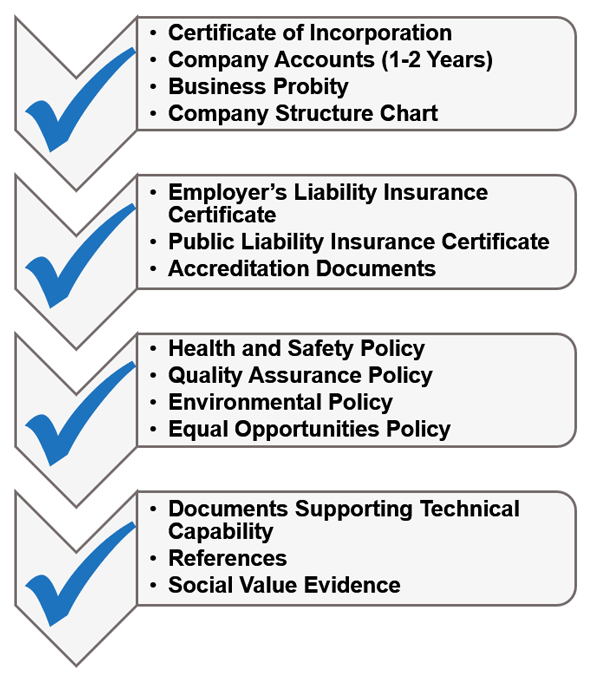The higher the contract value, the more rigorous the whole tendering process becomes. This applies to both public sector (e.g. councils, central government, housing associations, utilities etc.) and large private sector corporations (e.g. PLCs). Use this fit to tender checklist to get ready to tender.

To tender for a contract, you may have to through a qualifying process e.g.supplier questionnaire (SQ), pre-qualification questionnaire (PQQ) or request for information (RFI). This can be time-consuming but if you do not qualify, you won’t get to tender.
The fit to tender checklist comes in two parts. The first lists of some of the key items you’ll need to respond to. The next details other important aspects that you need to consider when tendering.
SQ/PQQ & Tender Information Checklist
Do your business have enough information and the capability to give credible answers to the following items in a SQ/PQQ, proposal or tender?
- Administrative information
- Business probity
- Economic and financial standing
- Health and safety
- Quality assurance
- Technical capability (e.g. operations, specifications, manufacturing process)
- Customer care & service levels
- Equal opportunities
- Environment / sustainability
- Social value
- References
SQ/PQQ & Tender Documents Checklist
Do you have the following documentation that can be included in any SQ/PQQ, proposal or tender response? NB nowadays, you are not always asked to provide these with your submission. But you may be asked to do so on award of contract.
- Certificate of Incorporation
- Organisation / company / group structure chart
- Accounts for the last 2 years
- Employer’s liability insurance certificate
- Public liability insurance certificate
- Health and safety policy
- Quality assurance policy
- Equal opportunities policy
- Environmental policy
- Copies of accreditations / certificates
- Documents supporting technical capability
Self-Certification
Most public sector SQs do not ask you to provide supporting documentation. They simply ask you if you have XYZ. For example, they may ask if you have adequate insurance. However, if you are successful the authority will probably ask for the documents to prove your claims. Therefore, you may not be required to submit policies etc. when applying but you still need to make sure you have them in readiness.
Other Points to Consider
Is this tender right for my Company?
The tendering process is used to help buyers choose the right supplier(s) at the best value for money and to help them minimise risk. Not only do you need to ensure that everything mentioned above is in place, but you also need be confident that you can win the tender.
Is my company big enough?
- Generally, buyers check that the contract value does not exceed 50% of the bidder’s turnover.
- This is because the buyer wants to be sure the contract value will not be too much for the company to handle.
- The size of your company dictates the maximum size of contract it is likely to win
Can my company meet the buyer’s needs?
- You may look at a contract and think that your company can do most of the work. But if there are areas that it cannot manage, your chances of qualifying or winning can be seriously reduced.
- This may be specification, geographical location/coverage, mandatory accreditations etc.
Can I show relevant experience?
- Buyers want proof that suppliers can do the job. Therefore, references from similar organisations for similar work are ideal.
- If you haven’t got these, you will need to show you have ‘transferable skills’ from customers with similar needs.
- Is the work you are bidding for is a ‘core competence’ (i.e. it represents a large of your company’s turnover)? If not, it can reduce your chances of success.
Has my company got a long enough trading history?
- As shown in the above Tender Documents Checklist, public sector buyers generally ask for accounts for the last 1-2 years
- This means that start-ups are not always in the best position to win bids
Has my company got enough resources, time & tendering expertise?
- Tendering is time consuming – you will need to invest a lot of your time and resources to create a winning bid.
- Tendering can also be a daunting task – especially if you do not have the right skills or expertise.
What can I do?
- Wait for the tender opportunity that is right for your company – it is a waste of time tendering for contracts that you are not going to win!
- Continue to grow your company until it is better positioned to tender.
- Collaborate with another business that can complement your company and help minimise any of the ‘gaps’ mentioned above.
- Use consultants or other resources to help you through the tendering process.
More Useful Tendering Resources
Guide to commonly used Tender Terminology / Tendering Glossary
How to Qualify Tender Opportunities
Tony Zemaitis contributed to BT’s Upload magazine on Winning the Big Contracts – it includes his Top Tendering Tips
How to Win Tenders Blog – full of hints and tips on tendering

